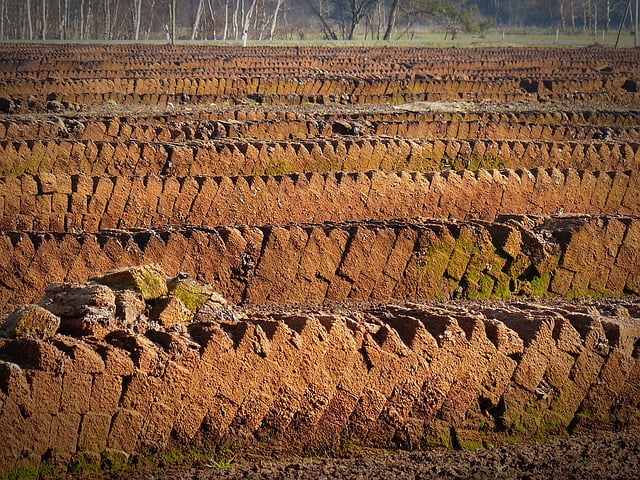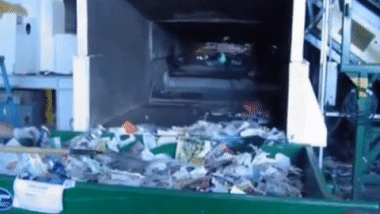We understand that you would like to know what Peat Free Compost is? Peat free compost is explained here so read-on!
What is Peat Free Compost? The Meaning of Peat Free Explained
Peat free compost is available for home garden use and to businesses. Just as it says pet free compost contains no peat. It is compost which is made from other types of composted biomass.
Examples of materials used in peat free composts are:
- Composted garden waste and bark
- Coir-based (i.e. fibre from the outer husk of the coconut) mixes containing biochar
- Composted bracken and wool waste
In the United Kingdom and many northern countries in the past, it has been common practice to use peat in compost sold commercially. Historically there was thought to be plenty of peat for this use and for burning as a fuel.

The most famous products of the past Leventon's compost were all 100% peat with added chemical fertiliser. That's it – peat with added chemical fertiliser to provide nutrients for the young plants.
Lowland Peat Bogs and their Wildlife Disappearing
Lowland peat bogs and their wildlife are are now threatened from this commercial use of a rare natural resource.
Peat extraction is no longer sustainable for garden composts and other uses in peat garden composts. Unfortunately, the peatland after the peat has been extracted, takes a very long time to recover and re-grow.
Peat moss grows very slowly. Even if these bogs were flooded again it would take hundreds of years before the peat was able to regrow and be harvested.
Once the peat has been used it is usually gone forever, because the land becomes drained for agricultural use. So, peat land wildlife has gone forever after most peat cutting.
Peat land wildlife such as dragonflies, butterflies, and birds, depend on peat for their survival. There is so little peat marsh left in some areas that many species are in danger of becoming extinct.
But the good news is that there is no need to use peat based compost. You can now choose renewable green garden waste compost alternatives.
Much like managing wetland restoration, peat bogs can be remediated, but are never the same as an untouched ecosystem. Like old growth forest, peat may be harvested rapidly, but takes generations to replace. It only grows a few millimeters (or less) per year.
Each year almost 32 million cubic yards of peat are harvested for horticultural use. via organicmechanicsoil.com That's an awful lot of precious peat!
Peat Free Compost
Peat free compost is available for sale and is often made from green waste, garden, and yard waste.
It is a totally natural material and eco-friendly product with a wide range of eco-friendly product with a wide range of eco-friendly uses.
It can contain ingredients such as uses such as recycled garden materials bark-fines Koya and wood fibre high quality par 100 Koya and wood fibre high quality PAS 100 compost.
Why is there Peat in Most Composts Commonly on Sale?
Peat is a wonderful medium for holding water. It also improves soil quality when mixed with soil by raising humic content and holding the structure open for healthy root growth. When first placed in the ground it also holds fertilizer added when it was packaged. The fertilizer is used by the plants, and creates healthy growth.
When plants grow in swampy areas die, they do not decompose properly. Instead they turn into a partially rotted organic material; a material know as peat. Many multi purpose composts contain peat as it can help retain water. It is for this reason that some gardeners will also bulk-buy peat in order to add to raised beds so they stay moist.
It is noteworthy that if your shop bought compost does not say that it is peat free then there is a strong chance that it does indeed contain peat.
Why go Peat Free?
There are many reasons for not using peat; firstly, peat renews at approximately 1mm per year, therefore it is considered a non-renewable resource. Secondly, peat bogs store carbon, a lot of carbon. In fact the equivalent of 20 years of industrial carbon is stored in British peat bogs alone. The more that this erodes, the more carbon is released into the atmosphere.
What's more, when peat is cut the exposed areas that remain often dry out, thus releasing carbon even when the peat is not cut and used as compost.
Thirdly, peat bogs are a threatened habitat. A unique ecology, which is home to a huge array of flora and fauna. Many of these species are found nowhere else, but thrive in such conditions. This includes birds, such as snipe and the skylark, which breed on peat bogs. Many lovely butterflies and dragonflies would also be lost if peat bogs disappear.
Although some of the cut peat is used as fuel, the vast majority of it is used by gardeners. It seems that in our attempt to create our own little wilderness, peat compost users are selfishly robbing another. via theecologist.org
Peat Free Compost Made from Household Green Waste
The green waste used in these products is guaranteed to only be these products. Plus, green waste is guaranteed to be made made only from green waste, and not from the organic fraction of mixed household organic waste, fraction of mixed household waste it has been estimated that around:
- Half a million tonnes of carbon dioxide is emitted each year as a result of peat extraction from united kingdom peat-land.
- In addition this for horticultural use in addition this for horticultural use in addition this doesn't take account of the fact that we (the UK) imports as much peat again each year from overseas, but, using peat free compost is even better than just saving all this direct carbon dioxide being emitted.
- The reason that peat free compost is so that peat free compost is so beneficial to the environment, is that if the green waste it is made from was not made into compost, it would be sent to landfill.
- Not only are landfills much disliked and damaging to the local environment but this organic waste also creates methane. If methane escapes to the atmosphere it is 21 times more damaging as a greenhouse (climate changing) gas than carbon dioxide.
Other Sources and Brands of Peat Free Compost
Peat free compost can be wonderful compost. Some of my best tomatoes have been grown in pots where toadstools (not to mention the odd toad) have appeared. This is no surprise: fungi decompose organic matter, releasing plant foods as they do so. Many peat-frees are blessed with beneficial, plant-friendly fungi which are largely absent from sterile, peat-based mixes.
Locating a good, reliable supplier of quality peat-free compost can be frustrating, and peat-based products still tend to elbow them out. Fortunately, Carbon Gold, Fertile Fibre and Dalefoot Composts (suppliers of Wool Compost) all offer a reliable mail order service. Clubbing together with friends to place a larger order can save money.
For those who want to be as organic as possible, from seed to plate, Carbon Gold and Fertile Fibre both offer coir-based peat-frees, certified by the Soil Association for organic growing (both also make compost used by commercial organic growers).
To grow acid-loving plants, such as azaleas, blueberries and camellias in containers, peat and lime-free potting composts are available. Vital Earth Ericaceous Compost is available from garden retailers, and Ericaceous Wool Compost (from Dalefoot Composts) by mail order. via telegraph.co.uk
Peat-free compost – what are the environmental benefits?
Peat is mined from raised bogs, the remains of a priceless primeval wilderness. They are formed from the decaying remains of plants such as sphagnum mosses. These bogs are home to a variety of plant and wildlife species which can only exist in this unique environment. Because of this, many peat bogs are Sites of Special Scientific Interest (SSSIs).
The attractively bagged peat packs that you see in a garden centre represent an ecological disaster.
The UK Government's policy is that peat should be conserved. Conservationists and campaigning organisations are working to achieve a complete ban on peat mining.
You can learn more about the issues by reading English Nature – peat bog conservation PDF. Or search for ‘peatlands campaign’ in Google.
Gardening enthusiasts account for 60% of the peat bought in the UK. So, by purchasing an alternative product, you are making a real difference. via fertilefibre.com
List of Peat Free Compost Products
| Peat Free Compost Product | Compost Source | Price (2018) £ (GBP) |
| New Horizon organic and peat-free multipurpose compost | ~ | £5.99 for 50 litres |
| Vital Earth multipurpose compost | Composted garden waste and bark | £5.99 for 50 litres |
| Carbon Gold all-purpose biochar compost | Coir-based mix containing biochar | £8.95 for a 20-litre bag |
| Wool compost | Composted bracken and wool waste | £12.95 for 30 litres |
| Fertile Fibre multipurpose compost | Organically certified, coir mix | £11.95 for a 35-litre bag |
| Source: theguardian.com |
Summary – What is peat free compost?
We hope that you will now understand why peat free compost is the type of compost all good gardeners should seek out.
When you look for compost, you should seek out peat free compost.
We hope you enjoy your gardening and have success with Peat Free Gardening. Article includes text as found on Youtube at: CompostTheVideoExplanation.






